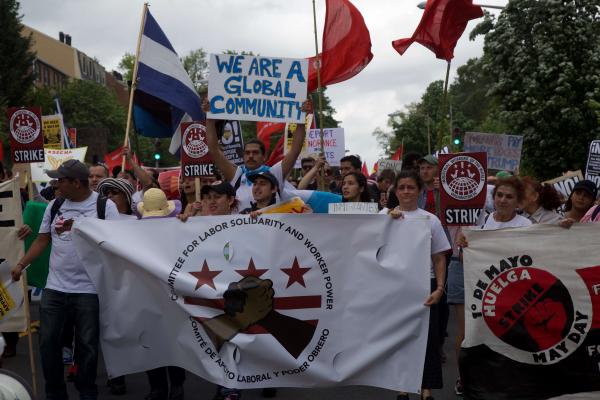In his 2016 presidential campaign, Donald Trump regularly pit blue collar workers against immigrants, stoking fear of the “other” in those worried about job automation and globalization.
But in fact, immigrants and union workers’ concerns and priorities are often aligned.
And today their voices were aligned, as they marched together through the streets of Washington, D.C., for the May Day Action in solidarity with immigrants and workers.
The organizers of May Day Action highlighted this history in their day of events, that, among other actions, included a rally for striking workers and immigrants, and a large-scale march to the White House. Their platform highlights the connection and common cause of workers and immigrants, saying, “Workers continue losing their jobs to changing industries and to advancing technology. Unfortunately, immigrants seem to be the ones getting blamed for the shortfall.”
May 1 is International Workers Day, an annual holiday to push for the well-being of workers around the world. In 1955, the Catholic Church also declared May 1 to be the feast of St. Joseph the Worker, which celebrates the working class nature of the Holy Family.
Labor unions have organized May 1 marches for more than a century, rallying support for shorter work hours, benefits, and safe working conditions. This year, for the first time, they are explicitly partnered with immigrants’ rights groups for the May 1 action.
Immigrants rights groups like CASA are teaming up with labor unions including local SEIU and AFL-CIO chapters, following a trend of marches this year that have sought intersectional platforms. The People’s Climate March, just two days before, broadened its platform to include racial and economic justice. And the platform of the Women’s March in January was similarly broad, adding LGBTQIA, worker, and disability rights.
At a rally in Mt. Pleasant, Zeferina, a member of the Committee for Labor Solidarity & Worker Power with the D.C. community group Many Languages One Voice, spoke to the intersection of immigrant and workers rights. She talked about abusive employers, saying, “They treat workers as if they are machines… They see us as if we were just cheap labor, when really we are the labor force of this country.”
Ruby Corado, activist and founder of Casa Ruby, further broadened the call to action, reminding the crowd of the struggles facing LGBTQ people of color.
On Monday, organizers physically represented this united platform in the design of the march route. A rally for immigrants took place at Lamont Park in Mt. Pleasant in D.C. A rally for workers began a mile south at Malcolm X Park in the Columbia Heights neighborhood. After speeches and chants, the two groups converged, moving from historically black and immigrant neighborhoods down 15th Street to the White House. At the White House, they joined leaders from CASA and SEIU who earlier held a pro-immigrant, pro-worker rally in Dupont Circle.
The organizers' asks are simple: The march represents a unified effort “for respect, dignity, equal rights, and opportunity.” At the march in D.C., marchers were a little more confrontational, carrying signs that said “Deport Ignorance, Not Immigrants” and “Immigrants Pay More Taxes Than Trump.”
Outside of D.C., workers and immigrants planned 149 actions in 35 states. In many states, the day was honored with mass walkouts and closures of immigrant owned businesses. In upper Manhattan, immigrant owned taxi stands and convenience stores closed during rush hour. In Wisconsin, immigrants are striking from their jobs at dairies, an industry where an estimated 80 percent of workers are immigrants.
This large nationwide turnout mirrors greater attitudes in the U.S. A study by Public Religion Research Institute shows that more than half of Americans believe immigrants “strengthen American society,” and more than 60 percent believe that there should be a pathway to citizenship for undocumented immigrants.
Although white Christians hold starkly different views — three of the four religious groups most likely to be in favor of deporting undocumented immigrants were white Christians — the May Day of Action was a powerful witness to the strength of immigrant workers, small businesses, and communities.
Got something to say about what you're reading? We value your feedback!

